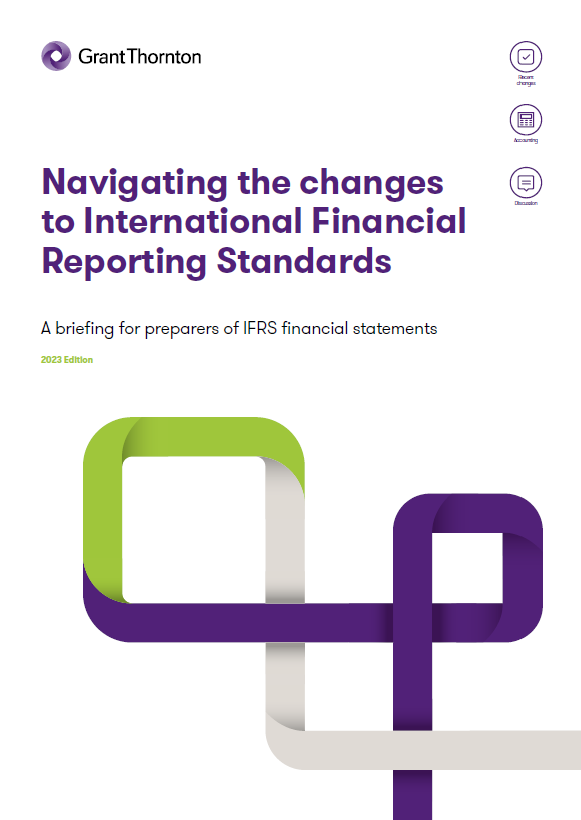-
Audit methodology
At Grant Thornton, we use a single audit methodology across our global network. This means that our clients gain the same proven, high-quality approach wherever they are.

-
Financial statements and consolidated financial statements
Preparation of monthly, quarterly or annual report and consolidated report on the basis of information presented by the client.
-
Financial Accounting
Effective bookkeeping and financial accounting are essential to the success of forward-thinking organisations. To get the optimum benefit from this part of your business, you'll need an experienced team behind you.
-
Tax compliance
Tax is likely to have an impact on almost every business decision you make. Whatever your business’s specific needs, we respond quickly and devise solutions tailored to you. We perform VAT, income tax, social tax and other tax accounting as well as present tax declarations to the tax authorities.
-
Chief financial officer service
Chief Financial Officer services include the periodic reporting, information systems standardization, internal document management and information flow optimization, budget preparation, cost accounting, cash flow and working capital management, financial analysis, investment return evaluation for managers.

-
International taxation
Grant Thornton operations in the Baltic States give us an access to the international expertise and allow advising the client on the minimisation of tax risks arising from conducting business in a foreign tax jurisdiction. We also consult foreign investors in finding an optimum group structure and form of enterprises in Lithuania and other Baltic States.
-
Transfer pricing
We advise the management bodies of local and multinational groups of companies in issues concerning transfer pricing of intra-group transactions and, if necessary, in the preparation of the relevant compliance documents. We also assist in preparing transfer pricing policies in order that future transactions are priced in accordance with the local as well as international regulations.
-
VAT refunds
We advise foreign clients in issues concerning the refund of value added tax paid in Lithuania, and Lithuanian clients – in the refund of value added tax paid in the EU member states. If necessary, we carry out these procedures on behalf of the client.
-
Profit tax, tax incentives
Our tax advisory department consults local and international clients in both everyday and specific taxation issues related to business activities.
-
Due diligence
Making the right investment decision can have a significant impact on shareholder value. To make an informed investment decision and create the best value from the transaction you will need the following an understanding of the target business identification and understanding of key business drivers an understanding of all the relevant issues clear analysis, conclusions and recommendations.
-
Assistance and representation during tax investigations, inspections, disputes
We provide services for registration in the Register of Taxpayers and the Register of VAT Payers. We represent clients' interests in tax disputes at the State Tax Inspectorate, Tax Disputes Commission, courts and other institutions.

-
Legal advisory for business start
We assist to quickly establish a company, branch or permanent establishment in Lithuania, open a bank account, VAT registration and obtain all necessary licenses for activity.
-
Legal advisory for business development
Our team has gained the greatest experience in advising international companies on the management of groups of companies. We advise and implement reorganizations or liquidations. Together with a team of tax and financial advisors, we perform a comprehensive due diligence (tax, legal & financial).
-
Labor law for CEOs and employees
We provide modern labor law solutions for the CEO, C-level managers and employees, which are tailored specifically to your business industry. We will take care of well-judged employment contracts and benefits package, protection of confidential information and non-compete agreements, handling of employee data or stock option rules, posting of employees, employment of EU and third-country nationals, organization of telework.
-
Fintech
With extensive experience in money laundering prevention and compliance and a strong team of financial experts, we advise clients on financial services, electronic money, licensing of payment institutions, capital formation, listing of mutual lending platform operators and other operational issues.
-
Migration and relocation
We assist you, your family members and employees of the organization to obtain national and European Union (Schengen) visas, residence permits, e-resident status, provide mediation letters and ensure a smooth relocation to Lithuania.
-
Due diligence
Making the right investment decision can have a significant impact on shareholder value. To make an informed investment decision and create the best value from the transaction you will need the following an understanding of the target business identification and understanding of key business drivers an understanding of all the relevant issues clear analysis, conclusions and recommendations.
-
Fintech advisory
The rapidly changing world and evolving technology are driving the development of new business models such as acting as a payment institution, a provider of virtual currency services and a financial institution. Grant Thornton Baltic provides support and advice to these companies.
-
Corporate finance management
Building a successful business requires a clear vision backed by a focused strategy. To achieve this vision, businesses must negotiate an increasingly complex environment.
-
Business Valuations
Choosing the right valuation method is the most important element in the process of estimating the fair value of a business as it must be adequate in terms of the purpose and object of the valuation. Grant Thornton uses only proven and generally accepted methods from among the wide range of income, asset and market approaches. Having conducted a preliminary analysis of the object and purpose of the valuation, we identify the method that will be the most appropriate considering the situation and characteristics of a given enterprise and the business sector in which it operates. Prior to commencing valuation, we also identify the documents necessary in the process.
-
Mergers and acquisitions
We provide advice to clients in all material aspects of the process of conducting transactions: finding a candidate for buyer, purchase or merger, initial analysis and valuation, negotiations, due diligence, structuring transaction price, preparing legal documentation and formal closing of the transaction. We also provide consultation for management buyouts.
-
Protection of Interests of Bondholders'
Grant Thornton provides bondholders' advocacy and protection services. We have resources, knowledge and the latest technology. Defending the interests of bondholders · Representing the interests of bondholders
-
External Financial Management Services
Providing an external financial management services makes it possible to manage a company’s finance on a day-to-day basis by a competent economist, without the need of offering full-time employment. By cooperating with experts on managing big-budget projects, we provide our clients with excellent support in comprehensive management of company’s finance.
-
Training
Financial Management Training and Seminars. Our experts have significant regional competence and close co-operation with our global colleagues. They happily share their expertise with our clients.

-
Internal Audit Services for Financial Sector Companies Licensed in Lithuania
Internal audit services adapted to Lithuanian financial sector companies ensure compliance with regulatory acts, risk management and operational excellence.
-
Internal Audit Services for EU/Foreign Aid Projects
Internal audit for EU/foreign aid fund projects helps to ensure compliance of activities and related costs with requirements.
-
Internal Audit for the Companies Certified by ISO
Internal auditing ensures ISO standard compliance, evaluates management system effectiveness, and gathers objective evidence of performance.
Distributed ledgers have grown beyond their cryptocurrency roots and the once-emerging technology is at last ready for your business to put it to work right now.
An alternative currency
Blockchain, the technology behind the bitcoin digital currency, has broken loose from its origins. Given the explosion of interest in blockchain beyond financial services across utility, transportation, business and governmental industries - it is gaining momentum.
The days of talking about blockchain's potential have passed and organisations around the globe are not just building proofs of concept but many are already using it for live applications. Blockchain is being rolled out across sectors from energy supply and property sales to facilities management, environmental provenance and container shipping. However, the technology remains surrounded by a mist of uncertainty.
To bring some clarity and pragmatism to our understanding of the technology, and evaluate how it can benefit an organisation, we need to remove it from its digital currency origins.
The genesis of bitcoin
In 2009, in the wake of the worldwide financial meltdown, an anonymous developer(s) using the moniker Satoshi Nakamoto created an alternative, digital-only financial currency called bitcoin.
Bitcoin was designed to enable simple financial transactions to take place between its participants, completely independently of banking institutions. Each transaction is recorded and validated not by a bank, but by the software architecture of the transaction system itself.
This underlying transaction technology system is blockchain.
What is blockchain technology?
It's essentially a live ledger that records the transactions of a 'token' – in this case, the bitcoin currency – arranged in data batches called 'blocks' that use cryptographic validation to link themselves together. Put simply, each data block references and identifies the previous block using a 'hash' function, forming an unbroken chain, hence the name.
This approach to recording data boasts a significant advantage over traditional financial ledgers and databases. By having every data block validate its direct predecessor, the ever-lengthening ledger is strictly sequential and permanent: it's not possible to amend, mask or delete transactions that have already been recorded. Any attempt to do so would break the cryptographic chain and be immediately flagged to all participants.
In principle, a blockchain ledger is a tamper-proof database with built-in validation.
The distribution of blockchains
The second key feature of blockchain is that the ledger is not maintained in a single location or managed by a single, monopolistic third-party. Instead, it is said to be 'distributed', existing on any number of computers at the same time in such a way that anybody with an interest can obtain a live copy of it.
As such, blockchain is sometimes referred to as a 'mutual distributed ledger' or MDL. It employs this mutual consensus mechanism across the network to guarantee trust in the whole system.
"Blockchain is based on a distributed, decentralised paradigm technology which allows the exchange of any kind of value between peers without using intermediaries" summarises Luis Pastor, partner of IT consulting and innovation at Grant Thornton Spain.
"The magic here is that you don't need a third party to make sure that what is happening in the network between peers is correct."
Staying with the digital currency concept, this would enable you to send money from, say, one country to another without having to pass through a clearing house. Rather than taking two or three days for the transaction to be validated by a third party, the sender and recipient are automatically identified by their encrypted digital signatures, the money is transferred from one wallet to another and the transaction is recorded to the ledger within seconds.
Blockchain networks
"With blockchain," says Pastor, "we can represent any kind of value through tokens. In the financial world that could be a bond or a share, or property such as a house. The whole network, using its consensus mechanism, would validate the transaction to transfer the ownership.
It would be possible to represent any real-world asset as tokens on a blockchain. Once a network is created with different parties, these assets are going to be unique. The concept of ownership is really strong and made clear to everyone playing by these rules on a blockchain network."
Applications beyond so-called cryptocurrencies were first proven with the development of the Ethereum blockchain platform in 2013. Although the Ethereum eco-system encompasses its own digital currency known as ethers as its token, the platform introduced the ability to include not just basic numeric records but also small logistical programs into your ledgers.
These are known as 'smart contracts'.
Smart contracts
"These allow you to make arrangements or agreements between parties," says Pastor, "for example, to send funds on a certain date or to make changes to an asset's properties.
Another classic example of a smart contract in action might be the concept of insurance for delayed airline flights. When a traveller buys travel insurance for a specified flight, the purchase could be recorded in a blockchain. This smart contract is designed to check automatically with an external data source whether that flight suffers any delay and, if appropriate, pass a compensation payment straight to the traveller's wallet without the usual administrative overhead.
The potential for business-oriented blockchains has attracted the interest of big names in the IT industry far beyond its hacker roots. Microsoft customers, for example, can try out their own blockchain proofs of concept on its Azure cloud.
It's important, then, to recognise that there is more than one way to implement blockchain.
Privacy concerns around blockchain
A key concern with raw blockchain is that its distribution aspect can be a disincentive. That is, a group of parties with an interest in establishing a blockchain to record industry-wide transactions may well be competitors willing to share limited privileged data flow with each other, but not with the public at large.
This need has led to the development of private blockchains, sometimes referred to as 'permissioned ledgers'. These are protected by security barriers and made available only to interested parties with permission to access the data.
With a private blockchain, richer data can be recorded into the ledger that might otherwise breach data security requirements laid down by regulatory bodies. Bitcoin's blockchain, for example, records transactions and wallet references as public keys but contains no personal information as to whom the wallets belong.
Bitcoin and energy consumption
One concern about blockchain is that it is energy-intensive. Being the first major system based on the technology, bitcoin is arguably the worst offender.
Trust in blockchain is centred around data miners to keep the system up and running, for which they earn a small fraction of newly minted bitcoins, but the server farms employed in the relentless data mining process are said to chew through as much energy as a small city. Many of these server farms are operated in China, whose rising carbon emissions are a matter of record.
Add to this the energy requirement of every bitcoin owner to keep their wallets updated with the current version of the ledger, to which new blocks are added every few seconds, and you're talking about a lot of electricity. It has been estimated that a bitcoin transaction can be as much as 5,000 times more energy intensive than a Visa credit card transaction.
That said, these costs are offset given that blockchain allows for real time transactions and information sharing and, hence, little or no intermediary costs.
Moving forward
Blockchain can be designed to be leaner and less energy-intensive. A well-designed blockchain should be able to process tens of thousands of transactions per second and cost less than 0.00001c each – a far cry from bitcoin's seven transactions per second costing anything up to $2.50 each.
As a result, organisations that have been spending the last couple of years investigating blockchain have now begun taking their systems live and bringing customers and competitors alike into the fold. With the promise of speeding up data flow and removing administrative overheads, blockchain is as much about streamlining processes as just cutting costs.
In our next two articles, we look at the businesses currently active in the roll-out of real-world, commercial blockchain solutions, as well as practical steps explaining how to set about introducing blockchain into your own organisation.
There used to be a joke that the most common software employed in blockchain development was PowerPoint.
Not any more.



